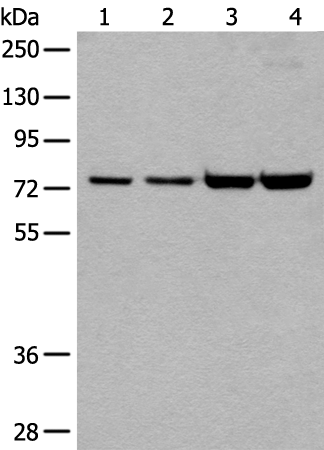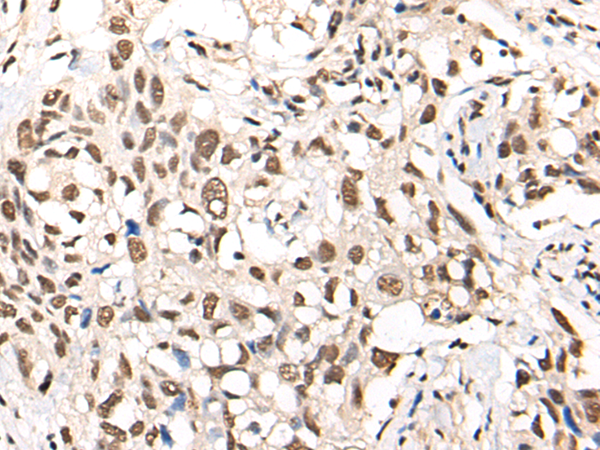

| WB | 咨询技术 | Human,Mouse,Rat |
| IF | 咨询技术 | Human,Mouse,Rat |
| IHC | 1/25-1/100 | Human,Mouse,Rat |
| ICC | 技术咨询 | Human,Mouse,Rat |
| FCM | 咨询技术 | Human,Mouse,Rat |
| Elisa | 1/5000-1/10000 | Human,Mouse,Rat |
| Aliases | PID; MTA1L1 |
| WB Predicted band size | 75 kDa |
| Host/Isotype | Rabbit IgG |
| Antibody Type | Primary antibody |
| Storage | Store at 4°C short term. Aliquot and store at -20°C long term. Avoid freeze/thaw cycles. |
| Species Reactivity | Human, Mouse |
| Immunogen | Synthetic peptide of human MTA2 |
| Formulation | Purified antibody in PBS with 0.05% sodium azide and 50% glycerol. |
+ +
以下是3篇关于MTA2抗体的参考文献及其摘要概括:
1. **文献名称**:*"MTA2-mediated transcriptional repression in breast cancer cells is independent of NuRD complex"*
**作者**:Mazumdar, A. et al.
**摘要**:该研究利用MTA2抗体通过免疫共沉淀(Co-IP)和染色质免疫沉淀(ChIP)技术,证实MTA2在乳腺癌细胞中通过非NuRD复合体依赖的途径抑制特定基因转录,揭示其表观调控的多样性。
2. **文献名称**:*"Overexpression of MTA2 correlates with poor prognosis in colorectal cancer"*
**作者**:Toh, Y. et al.
**摘要**:通过免疫组化(IHC)结合MTA2抗体分析结直肠癌组织样本,发现MTA2高表达与肿瘤侵袭性及患者生存率降低显著相关,提示其作为预后标志物的潜力。
3. **文献名称**:*"MTA2 interacts with deacetylases to regulate p53-dependent apoptosis"*
**作者**:Li, D. et al.
**摘要**:研究采用MTA2抗体进行Western blot和免疫荧光实验,证明MTA2通过招募组蛋白去乙酰化酶(HDAC)调控p53活性,影响肿瘤细胞凋亡通路。
4. **文献名称**:*"MTA2 promotes invasion in ovarian cancer via E-cadherin suppression"*
**作者**:Kumar, R. et al.
**摘要**:通过shRNA敲低MTA2并结合抗体检测蛋白表达,发现MTA2通过抑制E-cadherin表达增强卵巢癌细胞侵袭能力,机制涉及上皮-间质转化(EMT)。
这些文献均通过MTA2抗体验证其在癌症中的功能,涵盖表观调控、预后关联及分子机制等领域。
The MTA2 (Metastasis-Associated Protein 2) antibody is a tool used to study the MTA2 protein, a member of the MTA family involved in epigenetic regulation and cancer progression. MTA2 functions as a core component of the NuRD (Nucleosome Remodeling and Deacetylation) complex, which modulates chromatin structure and gene expression through histone deacetylation and ATP-dependent chromatin remodeling. It plays a critical role in transcriptional repression, DNA repair, and cell cycle regulation.
MTA2 overexpression is linked to tumor metastasis, poor prognosis, and therapy resistance in cancers like breast, colorectal, and prostate. Its antibody enables detection and quantification of MTA2 in techniques such as Western blotting, immunohistochemistry (IHC), and immunofluorescence (IF), aiding research into its oncogenic mechanisms. Studies using MTA2 antibodies have revealed its interaction with pathways like Wnt/β-catenin and HIF-1α, highlighting its role in promoting epithelial-mesenchymal transition (EMT) and angiogenesis.
Compared to other MTA family members (e.g., MTA1. MTA3), MTA2 exhibits distinct tissue-specific expression and regulatory functions. The antibody’s specificity ensures accurate differentiation of MTA2 isoforms, supporting investigations into its dual roles as a tumor suppressor or promoter depending on cellular context. Research utilizing MTA2 antibodies continues to advance understanding of epigenetic dysregulation in cancer, offering potential therapeutic targets.
×